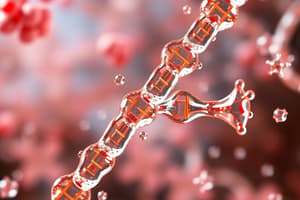Podcast
Questions and Answers
What is the distinct region in an enzyme's molecular structure where specific interactions with the substrate occur?
What is the distinct region in an enzyme's molecular structure where specific interactions with the substrate occur?
- Active site (correct)
- Allosteric site
- Inhibitory site
- Catalytic site
What is the main purpose of enzymes in biological processes?
What is the main purpose of enzymes in biological processes?
- Alter the pathway leading to a product by raising energy barriers
- Increase thermodynamic equilibrium
- Speed up reactions without being consumed (correct)
- Change the overall balance between reactants and products
Why are enzymes considered catalysts?
Why are enzymes considered catalysts?
- They alter the thermodynamic equilibrium constant.
- They lower energy barriers without being consumed. (correct)
- They decrease reaction rates.
- They increase the activation energy of reactions.
Which health condition can elevated liver enzymes potentially indicate?
Which health condition can elevated liver enzymes potentially indicate?
What is a metabolic disorder that can result from deficiencies in certain enzymes?
What is a metabolic disorder that can result from deficiencies in certain enzymes?
Which industrial application involves using enzymes to create washing powders and cleaning products?
Which industrial application involves using enzymes to create washing powders and cleaning products?
What is the main function of enzymes in living organisms?
What is the main function of enzymes in living organisms?
Where do most industrial enzymes come from?
Where do most industrial enzymes come from?
Which category of enzymes is primarily involved in synthesizing and breaking down macromolecules within the cell?
Which category of enzymes is primarily involved in synthesizing and breaking down macromolecules within the cell?
What are enzymes made up of?
What are enzymes made up of?
Which enzyme is commonly used to break down starch into simpler sugars?
Which enzyme is commonly used to break down starch into simpler sugars?
What is the role of enzymes in catalyzing reactions?
What is the role of enzymes in catalyzing reactions?
Flashcards are hidden until you start studying
Study Notes
Enzymes: Nature's Biological Catalysts
Overview
Enzymes are essential proteins that play a crucial role in facilitating and accelerating biochemical reactions in living organisms. They are responsible for breaking down complex molecules into simpler ones, thus making reactions occur at a much faster rate. The incredible efficiency of these proteins allows us to carry out various activities, from converting the food we consume into energy to maintaining optimal liver function. This article delves deeper into the world of enzymes, exploring their functions, structures, and role in catalyzing various reactions in both natural and industrial contexts.
Types of Enzymes
There are two broad categories of enzymes: those found within cells (intracellular) and those present outside cells (extracellular). Most enzymes used industrially come from microorganisms, such as fungi and bacteria, and are typically extracellular proteins. Examples of these include α-amylase, cellulase, dextranase, proteases, and amyloglucosidase. On the other hand, intracellular enzymes are produced in small quantities by cells and are primarily involved in synthesizing and breaking down macromolecules within the cell. Examples of these include asparagine, catalase, and cholinesterase.
Structure and Mechanism of Action
Enzymes consist of large organic compounds called polypeptides, which are made up of long chains of amino acids. Their molecular structure includes a distinct region called the active site, where specific interactions between the enzyme and the molecule it acts upon, called the substrate, occur. When the enzyme binds to the substrate, the resulting complex lowers the activation energy required for the reaction to proceed.
One interesting aspect of enzyme action is that they do not alter the thermodynamic equilibrium constant of a reaction; rather, they simply adjust the pathway leading to a product by lowering energy barriers. This allows them to increase reaction rates without changing the overall balance between reactants and products in a system. Enzymes are considered catalysts because they speed up reactions without being consumed in the process.
Role in Biological Processes
Enzymes are integral components of many vital biological processes, including digestion and liver function. For instance, enzymes present in our saliva, pancreas, intestines, and stomach play crucial roles in breaking down fats, proteins, and carbohydrates, which are then utilized for growth and cell repair. Additionally, deficiencies or imbalances in certain enzymes can lead to metabolic disorders, such as phenylketonuria (PKU) and lactose intolerance.
Industrial Applications
Beyond their natural role within living organisms, enzymes have been harnessed for various industrial applications. They are used to produce sweetening agents, modify antibiotics, and create washing powders and cleaning products. Furthermore, enzymes play a significant role in analytical devices and assays for clinical, forensic, and environmental purposes.
Regulation and Monitoring
Enzyme activity is influenced by factors such as temperature, acidity, and presence of inhibitors. Healthcare providers can monitor enzyme levels in blood tests to diagnose certain health conditions, such as elevated liver enzymes that may indicate liver disease.
In summary, enzymes are essential proteins involved in facilitating biochemical reactions both within cells and outside of them. Their unique properties enable them to act as biological catalysts, accelerating reactions and playing critical roles in various aspects of life and industry.
Studying That Suits You
Use AI to generate personalized quizzes and flashcards to suit your learning preferences.




